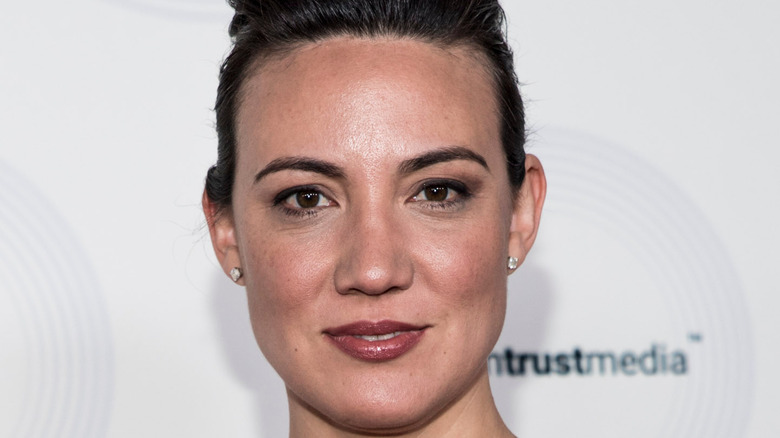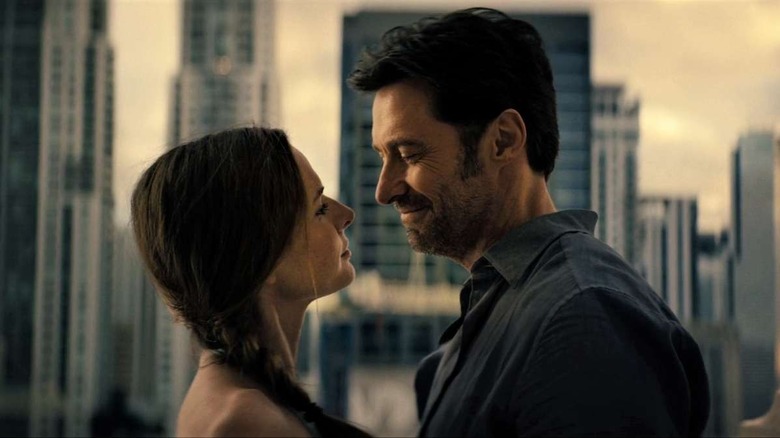Director Lisa Joy Dishes On Reminiscence's Mind-Bending Ending — Exclusive
It is not uncommon for a movie script to gestate for a while, though two decades is pretty long. But that's how long it took for the latest Hugh Jackman movie, "Reminiscence," to make its way from the mind of writer-director Lisa Joy to the big screen.
While talking about her first meeting with now-husband Jonathan Nolan, Joy revealed that her first ideas about exploring the concept of memory came to her around that time. "I met [Jonathan] at the 'Memento' premiere and was like, 'Dammit, I wanted to do something about memory.' It only took me 20 years to catch up," Joy told The Hollywood Reporter. "So I started with the idea of this longing and nostalgia and the very personal feelings it evoked in me, and then I built the world from that and built upwards from that."
"Reminiscence" is a classic noir story in which pseudo investigator Nick Bannister (Hugh Jackman) falls in love when a mysterious dame named Mae (Rebecca Ferguson) walks into his establishment. But as you might expect, Joy turns the story on its ear. Not only is Mae more than she seems, but Bannister has the technology to see past memories and use them to discover the truth.
Arguably the most complex part of "Reminiscence" lies in how its ending plays out. Looper sat down with Lisa Joy to talk about the film's ending and why it had to end that way.
Reminiscence has a happy ending, but not the usual kind
At the end of "Reminiscence," Mae is dead and Nick Bannister agrees to spend the rest of his life reliving his memories of being in love and happy with Mae. As he remains locked in his fantasy, he is watched over by his former business partner Watts (Thandiwe Newton). The first thing we wanted to know from Lisa Joy was whether or not that was always her intended ending.
"Yeah, that was always the ending for me," Joy revealed. "I consider it to be a dual happy ending. The idea of Watts being able to surmount her demons and her shame and move forward, of course, that is a beautiful and classic arc, and she brings it to life with such warmth and humanity. And I wanted that because that's so important. That kind of stoicism is so important in life, to be able to pick yourself back up and just keep marching forward, especially if you're a woman."
Joy said the characters' ending struck a chord with her. "The idea of Bannister and Mae and what happens to them as being a happy ending, for me, it's like ... And this really struck me when I was talking to my mother-in-law during COVID," Joy explained. "She was all alone, living in this little house for like two years and she's widowed. So she was really all alone and you can Zoom her as much as you want, but it's terrible. We would talk about memories and about things that we did together. And she would talk about my husband when he was a little boy."
For Joy, sometimes the happiest endings don't exist in the future, but the past. "To be able to live in that happiness, I mean, I would wish it on a lot of people," Joy said. "I would wish it on a lot of people who are suffering, who are suffering with depression or loneliness or grief. Sometimes you just want to hit the off button just to survive that moment, and to go back into memory and remember the things that were beautiful and the things that you cherish. I think that's a completely lovely way to also have a happy ending."
"Reminiscence" is in theaters and streaming on HBO Max now.

